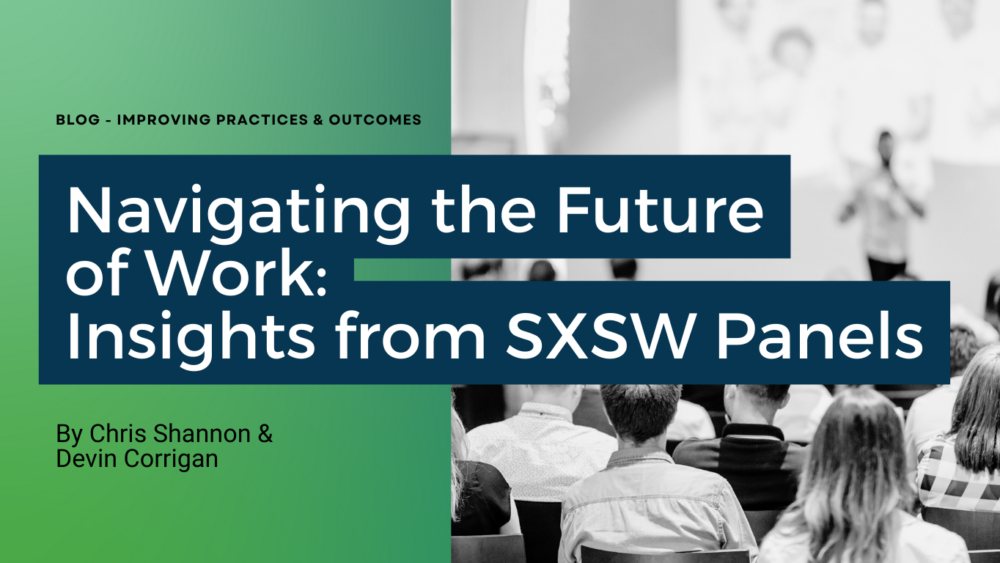CSW Senior Policy Associates Devin Corrigan and Chris Shannon recently attended the 2024 South by Southwest (SXSW) Conference and Festivals in Austin, Texas. While typically known as a showcase for music, film, and tech advances, SXSW is also a melting pot of cross-sector innovation and forecasting. This was the first year organizers added a workforce track; accordingly, diversity, equity, and inclusion (DEI) joined artificial intelligence (AI) advancements as key topics of interest for us.
Below are top takeaways and their potential impacts on workforce development:
Both the polarized socio-political climate and AI will force DEI efforts to evolve.
Despite the growing recognition of the importance of DEI initiatives, they face significant legal and cultural threats in today’s landscape. Legislative and policy changes, driven by opposition to social justice initiatives, pose real challenges to current DEI programs. The current backlash against DEI will only continue to intensify, caused, in part, by financial strains in sectors like tech and higher education where DEI is often seen as an added cost. This backlash is not unusual—equity proponents know that it occurs cyclically; we have decades of equity advances taking us two steps forward until a backlash takes us one step back.
This backlash does not represent an end to DEI, just the need for this work to evolve. As one panelist said, “The future does not fit the containers of the past.” Advocates are taking this opportunity to reflect and act on challenges within the DEI field, such as the current common practice of DEI being used punitively in the workplace, the lack of accountability and regulation, little agreement around terms and definitions, and unqualified individuals in DEI roles. Taking a step back will allow the DEI to create accountability measures, rebrand, and identify clear DEI metrics.
Experts shared that DEI is in metamorphosis and that DEI consultants will start to take more of a leadership role in defining the scope of work, rather than allowing companies to define the work. The DEI field will lean into personal sharing in professional spaces, especially to form the personal connections needed for career advancement. Experts also anticipate the field becoming more focused on the intersectionality of identities, the multiple barriers they represent, and the more nuanced approach they require to truly advance equity.
Additionally, the pervasive bias within artificial intelligence (AI) compounds the difficulties of making real change for underrepresented workers. AI algorithms are often trained on data sourced from the web, which includes a plethora of racist, biased, and gender-stereotyped information and graphics. Consequently, AI systems perpetuate and reinforce these biases, raising concerns about fairness and equity in automated decision-making processes.
At the same time, AI is a tool that can be leveraged to chip away at structural barriers within the workplace that inhibit equity. For example, companies are already using AI tools to assess potential bias in job descriptions. The workforce development sector could couple these tools with population-specific expertise to provide fee-based services—such as creating more equitable job descriptions, more responsive workplace benefits, or more inclusive workplace policies—to help companies attract, support, and retain more diverse talent pool. The shrinking workforce will only intensify the need to find and support hidden talent; the time is right for the workforce sector to evolve its professional services beyond job placement.
Finally, AI is supporting the evolution of equity in the workplace. For example, AI can help address language barriers and improve cross-cultural communications among diverse workers or multi-national work teams. AI is already being used by human resource professionals—AI pioneers!—to better understand ways they can improve corporate culture, from providing summaries of qualitative data to reduce biases in performance reviews to assessing trends in resignation letters. Workforce professionals should continue to track these trends to understand the many ways AI can help businesses better support a diverse workforce.
AI is being used to advance skills, not to define jobs.
Another significant shift discussed at SXSW is the transition from traditional job roles to project-based work and the importance of acquiring diverse skills. Instead of focusing solely on job-specific training, workforce programs should prioritize developing transferable skills across different projects and industries. Panelists encouraged workers to be “omnivores of information” to increase flexibility and enhance employability in an ever-changing job market.
This aligns with what we are learning from our Worker-Centered Benchmarking project. In this research project co-designed and led by workers and learners, building self-confidence in one’s skills and capabilities emerged as a critical indicator of program success in the eyes of participants. As one respondent shared, “I can get and lose ten jobs in a year. It doesn’t matter. Increased sense of self-confidence and sense of self-esteem will stay with me for life.” Building discrete skill sets that add value across sectors, such as data collection and analysis, gives workers the self-confidence they need to apply for new jobs in high-demand sectors, making them more resilient during economic downturns.
Workforce development organizations might consider exposing workers and learners to AI early and often, despite the current uncertainty of AI’s future role in most sectors. Experimenting with and testing AI’s capabilities is not about implementing AI; it’s about changing the way we work. That is why panelists agreed that early exposure and experimentation will position job seekers for living wage employment and job stability; one panelist estimated that students who have AI exposure enter careers ten years ahead of their peers. While current workers may need upskilling in AI to remain relevant, early pioneers and adopters who possess AI skills will be in high demand. As one panelist succinctly stated, “AI won’t steal your job. The person who knows how to use AI will.”
The shift from roles to skills has significant implications for workforce development strategies. Training programs should prioritize skill acquisition and competency development over job-specific training. Project management can open opportunities in a wide array of sectors; more specific skill sets, like HVAC skills, might limit a worker’s job stability and career advancement within a community. But this doesn’t have to be an “either-or” proposition—a good place to start could be to introduce skills that are evergreen into existing training programs. By emphasizing transferable skills across industries and roles—like understanding AI’s challenges and the potential value it creates—workforce development initiatives can better prepare individuals for the dynamic nature of the modern workplace.
There are emerging use cases for AI in training and the workplace.
Here is a list of the more fascinating use cases for AI that we heard at SXSW:
- Some organizations are using AI to create and detail Learning and Employee Records by extracting skills from various online and document sources. This could create smoother transitions into jobs and benefit workers with training and work experience outside of the U.S.
- AI can be used in performance reviews by giving them structure, addressing recency bias and helping to create a first draft. Then it’s up to the manager to refine it, provide specific examples, and humanize it.
- AI is now being used to coach managers. It is being used to identify patterns and trends in performance data, offering insights into where managers excel and can improve. And, surprisingly, it can be used to foster emotional intelligence (EQ) skills by using natural language processing to analyze written and verbal communication for tone, empathy, and interpersonal dynamics.
- (Speaking of EQ…) According to a new study published in JAMA Internal Medicine, ChatGPT may be better at answering patient’s questions. They found that ChatGPT had 3.6 times more high-quality responses and 8 times more empathetic responses than physicians. (NOTE: ChatGPT responses are based on internet healthcare content which is still heavily racially biased.) Of course, human doctors still excel at the diagnosis and treatment of illnesses but could leverage Generative AI to build better rapport and trust with patients.
- Students in one EMT training program are writing up their patient triage and diagnosis notes and then feeding that into ChatGPT to double-check formatting and accuracy.
- Usher’s New Look and IBM announced a collaboration that will use AI to customize career-readiness learning plans for students of color focused on building their AI and professional workplace skills.
- AI may have a role to play in federal rule-making. Anyone who has tried to read federal regulations and guidelines knows that they are text-intensive. AI can be used to help write rules and the agencies’ rationales for their regulatory choices in language more accessible to a wider population. AI can also help craft more effective public comments, making them more democratic and less likely to be dominated by special interest groups.
We know we walked away from this year’s SXSW conference with new concepts to ponder and skills that enhance our future-thinking abilities. We hope that the insights we offer here will help workforce development organizations and advocacy groups reflect on their current programs and services and explore how programming might evolve to better position marginalized communities for economic resilience and mobility.
Meet the Author
Chris Shannon
Chris is a Senior Policy Associate with CSW’s Improving Practices and Outcomes Team. Chris supports systems change and transformation by developing organizational capacity through learning conversations, data analysis, and promoting shared insights to benefit systems. Continue Reading >>
Meet the Author
Devin Corrigan
Devin Corrigan serves as a Senior Policy Associate with CSW’s Federal, State, and Local Systems Change Team. In this role, she supports CSW in transforming multi-level workforce systems, policy, and practice to reduce poverty, increase economic mobility for low-wage workers, and address racial disparities. Continue Reading >>





Comments are closed.